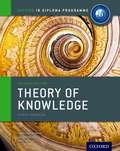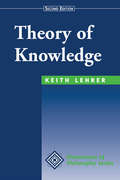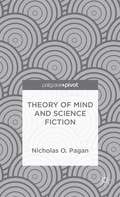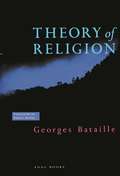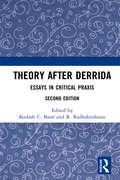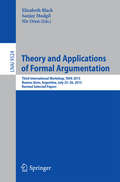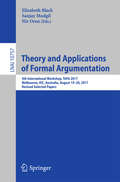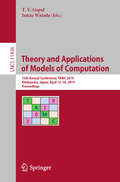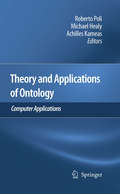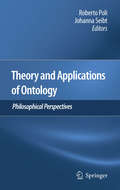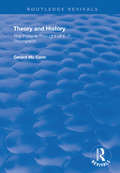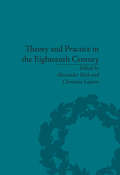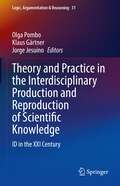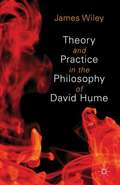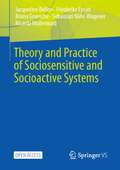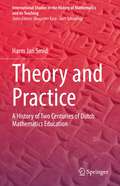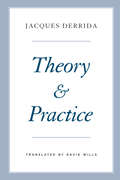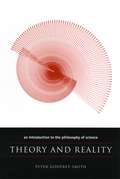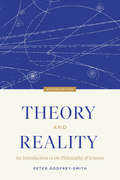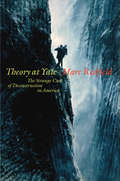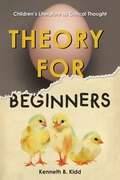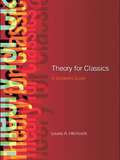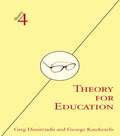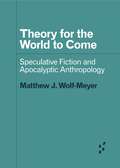- Table View
- List View
Theory Of Knowledge
by Eileen Dombrowski Lena Rotenberg Mimi BickThe only DP TOK resource developed with the IB. Build confident critical thinkers who can process and articulate complex ideas in relevant, real-life contexts. The enquiry-based approach actively drives independent thought and helps learners connect ideas and frameworks while pushing them above and beyond typical TOK boundaries. Completely mappedto the new 2013 syllabus. Supporting IB Theory of Knowledge: Skills and Practice book also available.
Theory Of Knowledge: Second Edition (Dimensions Of Philosophy Ser.)
by Keith LehrerIn this impressive second edition of Theory of Knowledge, Keith Lehrer introduces students to the major traditional and contemporary accounts of knowing. Beginning with the traditional definition of knowledge as justified true belief, Lehrer explores the truth, belief, and justification conditions on the way to a thorough examination of foundation theories of knowledge,the work of Platinga, externalism and naturalized epistemologies, internalism and modern coherence theories, contextualism, and recent reliabilist and causal theories. Lehrer gives all views careful examination and concludes that external factors must be matched by appropriate internal factors to yield knowledge. This match of internal and external factors follows from Lehrer's new coherence theory of undefeated justification. In addition to doing justice to the living epistemological traditions, the text smoothly integrates several new lines that will interest scholars. Also, a feature of special interest is Lehrer's concept of a justification game.This second edition of Theory of Knowledge is a thoroughly revised and updated version that contains several completely new chapters. Written by a well-known scholar and contributor to modern epistemology, this text is distinguished by clarity of structure, accessible writing, and an elegant mix of traditional material, contemporary ideas, and well-motivated innovation.
Theory Of Mind And Science Fiction
by Nicholas O. PaganTheory of Mind and Science Fiction shows how theory of mind provides an exciting 'new' way to think about science fiction and, conversely, how science fiction sheds light not only on theory of mind but also empathy, morality, and the nature of our humanity.
Theory Of Religion
by Robert Hurley Georges BatailleTheory of Religion brings to philosophy what Georges Bataille's earlier book The Accursed Share brought to anthropology and history, namely, an analysis based on notions of excess and expenditure. No other work of Bataille's, and perhaps no other work anywhere since Weber's Protestant Ethic and the Spirit of Capitalism, has managed to draw so incisively the links between man's religious and economic activities. <p><p> "Religion," according to Bataille, "is the search for a lost intimacy." In a brilliant and tightly reasoned argument, he proceeds to develop a "general economy" of man's relation to this intimacy: from the seamless immanence of animality to the shattered world of objects and the partial, ritual recovery of the intimate order through the violence of the sacrifice. Bataille then reflects on the archaic festival, in which he sees not only the glorious affirmation of life through destructive consumption but also the seeds of another, more ominous order -- war. <p> Bataille then traces the rise of the modern military order, in which production ceases to be oriented toward the destruction of a surplus and violence is no longer deployed inwardly but is turned to the outside. In these twin developments one can see the origins of modern capitalism.
Theory after Derrida: Essays in Critical Praxis
by R. Radhakrishnan Kailash C. BaralA critical anthology that re-examines Jacques Derrida’s thought by way of theory and praxis, this volume reflects on his striking legacy and the future of theory. Among contemporary thinkers, Derrida challenges not only our ways of thinking but also hitherto methods of inquiry. This book captures how Derrida renovates and re-energises philosophy by questioning the fundamental assumptions of Western philosophical thought. By doing so, he exposes the intricate lie behind binaries, such as speech/writing, nature/culture, male/female, black/white, literature/criticism, etc., which have continued to shape our worldview, where a hegemonic centre is always already in place dominating or marginalising the ‘other’. A significant contribution to literary theory, this book explores not only the status of Derrida’s contribution as a critical thinker but also the status of critical theory as such in the contemporary milieu. The central question that it asks is whether we should dismiss Derrida as a thinker who espoused an extreme form of relativism, bordering on nihilism, or has he something fundamental to contribute to the future of theory. Could it be that deconstruction is not destruction but a possibility that casts doubts on whether the present can have faith in future? This second edition includes a new Postscript and addresses some important concerns of our times, such as religious practice, art and aesthetics, translation, sociology of philosophy, and democracy. Scholars and researchers of English literature, philosophy, sociology and cultural studies will find this work particularly interesting.
Theory and Applications of Formal Argumentation
by Elizabeth Black Nir Oren Sanjay ModgilThis book constitutes the refereed proceedings of the Third International Workshop on the Theory and Applications of Formal Argumentation, TAFA 2015, held in Buenos Aires, Argentina, in July 2015. The workshop was co-located with IJCAI 2015. The 15 revised full papers presented were carefully reviewed and selected from 25 submissions. The papers deal with formal theoretical models of argumentation and application of such models in subfields of AI, evaluation of models, both theoretical and practical, and theories and applications developed through inter-disciplinary collaboration.
Theory and Applications of Formal Argumentation: Second International Workshop, Tafa 2013, Beijing, China, August 3-5, 2013, Revised Selected Papers (Lecture Notes in Computer Science #8306)
by Elizabeth Black Nir Oren Sanjay ModgilThis book constitutes the refereed proceedings of the 4th International Workshop on the Theory and Applications of Formal Argumentation, TAFA 2017, held in Melbourne, VIC, Australia, in August 2017. The workshop was co-located with International Joint Conference on Artifi cial Intelligence(IJCAI 2017). The 15 revised full papers presented were carefully reviewed and selected from 20 submissions. The workshops covers the subjects such as non-monotonic reasoning, decision making, inter-agent communication, the semantic web, grid applications, ontologies, recommender systems, machine learning, neural networks, trust computing, normative systems, social choice theory, judgement aggregation and game theory, and law and medicine.
Theory and Applications of Models of Computation: 15th Annual Conference, TAMC 2019, Kitakyushu, Japan, April 13–16, 2019, Proceedings (Lecture Notes in Computer Science #11436)
by Junzo Watada T. V. GopalThis book constitutes the refereed proceedings of the 15th Annual Conference on Theory and Applications of Models of Computation, TAMC 2019, held in Kitakyushu, Japan, in April 2019. The 43 revised full papers were carefully reviewed and selected from 60 submissions. The main themes of the selected papers are computability, computer science logic, complexity, algorithms, models of computation, and systems theory.
Theory and Applications of Ontology: Computer Applications
by Roberto Poli Achilles Kameas Michael HealyOntology was once understood to be the philosophical inquiry into the structure of reality: the analysis and categorization of 'what there is'. Recently, however, a field called 'ontology' has become part of the rapidly growing research industry in information technology. The two fields have more in common than just their name. Theory and Applications of Ontology is a two-volume anthology that aims to further an informed discussion about the relationship between ontology in philosophy and ontology in information technology. It fills an important lacuna in cutting-edge research on ontology in both fields, supplying stage-setting overview articles on history and method, presenting directions of current research in either field, and highlighting areas of productive interdisciplinary contact. Theory and Applications of Ontology: Computer Applications presents ontology in ways that philosophers are not likely to find elsewhere. The volume offers an overview of current research in ontology, distinguishing basic conceptual issues, domain applications, general frameworks, and mathematical formalisms. It introduces the reader to current research on frameworks and applications in information technology in ways that are sure to invite reflection and constructive responses from ontologists in philosophy.
Theory and Applications of Ontology: Philosophical Perspectives
by Roberto Poli Johanna SeibtOntology was once understood to be the philosophical inquiry into the structure of reality: the analysis and categorization of 'what there is'. Recently, however, a field called 'ontology' has become part of the rapidly growing research industry in information technology. The two fields have more in common than just their name. Theory and Applications of Ontology is a two-volume anthology that aims to further an informed discussion about the relationship between ontology in philosophy and ontology in information technology. It fills an important lacuna in cutting-edge research on ontology in both fields, supplying stage-setting overview articles on history and method, presenting directions of current research in either field, and highlighting areas of productive interdisciplinary contact. Theory and Applications of Ontology: Philosophical Perspectives presents ontology in philosophy in ways that computer scientists are not likely to find elsewhere. The volume offers an overview of current research traditions in ontology, contrasting analytical, phenomenological, and hermeneutic approaches. It introduces the reader to current philosophical research on those categories of everyday and scientific reasoning that are most relevant to present and future research in information technology.
Theory and History: The Political Thought of E.P. Thompson (Routledge Revivals)
by Gerard McCannFirst published in 1997, the aim of this book is to look at the historical materialism of E.P. Thompson while introducing him as a political thinker of distinction. The study examines many aspects of Thompson’s life and work to give a comprehensive statement on his theory of historical change. It surveys the intellectual background from which he emerged; the core values of socialist humanism as understood by his generation of the Left; his contribution to history from below; his critique of structuralist Marxism; and his practical input to political dissent. The scope of this study covers fifty years of socialist polemics and offers an insight into the battles which were fought out between the old and new Left until the collapse of command-economy communism in 1989. Throughout the work of Thompson is presented as a testimony to a lineage of social thinkers as well as to the ideal of the common weal much cherished by radical practitioners of the past.
Theory and Practice in Aristotle's Natural Science
by David EbreyAristotle argued that in theory one could acquire knowledge of the natural world. But he did not stop there; he put his theories into practice. This volume of new essays shows how Aristotle's natural science and philosophical theories shed light on one another. The contributors engage with both biological and non-biological scientific works and with a wide variety of theoretical works, including Physics, Generation and Corruption, On the Soul, and Posterior Analytics. The essays focus on a number of themes, including the sort of explanation provided by matter; the relationship between matter, teleology, and necessity; cosmic teleology; how an organism's soul and faculties relate to its end; how to define things such as sleep, void, and soul; and the proper way to make scientific judgments. The resulting volume offers a rich and integrated view of Aristotle's science and shows how it fits with his larger philosophical theories.
Theory and Practice in the Eighteenth Century: Writing Between Philosophy and Literature
by Alexander Dick Christina LuptonBrings together scholars who use literary interpretation and discourse analysis to read 18th-century British philosophy in its historical context. This work analyses how the philosophers of the Enlightenment viewed their writing; and, how their institutional positions as teachers and writers influenced their understanding of human consciousness.
Theory and Practice in the Interdisciplinary Production and Reproduction of Scientific Knowledge: ID in the XXI Century (Logic, Argumentation & Reasoning #31)
by Olga Pombo Klaus Gärtner Jorge JesuínoThis book addresses the urgent need for a large and systematic analysis of current interdisciplinary (ID) research and practice. It demonstrates how ID is essentially a cognitive phenomenon, something different from the frivolous and inconsequential attempt of trying to overcome the disciplinary competencies and exigencies. By ID, the authors show that it is a manifestation of the transversal rationality that underlies current scientific activity. It is the very progress of specialized disciplines that requires interdisciplinary new research practices and new forms of articulation between domains, something that has a strong impact on the traditional disciplinary structure of scientific and educational institutions. Divided into two parts, the book presents a conceptual framework as well as several case studies on ID practices. The book aims at covering three main themes. It contributes to the stabilization of ID meaning and characterizes the main ID theorizations which have been proposed until now. It builds an innovative and broad understanding of the several ID determinations as an essentially cognitive phenomenon and of its institutional implications at the level of disciplinary structures and curricular organization. Finally, it distinguishes and maps the diversity of ID procedures and practices which are being used and tested by contemporary scientific and educational institutions. This book is addressed to philosophers, scientists and every one interested in science production and reproduction, including science teaching.
Theory and Practice in the Philosophy of David Hume
by James WileyAn original interpretation of Hume's philosophy as centered on the relationship between theory and practice. The author argues that Hume's Essays and History represent a humanist practical philosophy derived from the speculative philosophy of A Treatise of Human Nature and the Enquiries .
Theory and Practice of Sociosensitive and Socioactive Systems
by Friederike Eyssel Bruno Gransche Jacqueline Bellon Sebastian Nähr-Wagener Ricarda WullenkordInteractive adaptive systems increasingly become part of our everyday life. Which factors could shape this development and under which conditions will interactions with technical systems be deemed socially appropriate? The "FActors of Social Appropriateness" (FASA) Model presented in this Open Access-book provides a structured approach to our understanding of social appropriateness in human-technology interaction. The FASA Model serves to inform design choices for sociosensitive and socioactive artificial assistants.
Theory and Practice: A History of Two Centuries of Dutch Mathematics Education (International Studies in the History of Mathematics and its Teaching)
by Harm Jan SmidThis book describes and analyses the history of Dutch mathematics education from the point of view of the changing motivations behind the teaching of mathematics over a 200 year period. During the course of the 19th century, mathematics in the Netherlands developed from a topic for practitioners into a school topic that was taught to almost all pupils of secondary education. As mathematics teaching gradually lost its practical orientation and became more and more motivated on the basis of its supposed formative value, the HBS (Hogere Burgerschool), the Dutch variant of the German Realschule, became the dominant school of thought for mathematics pedagogy. This book examines the gradual development of the field, culminating in the country-wide adoption of Realistic Mathematics Education as the new method of mathematics teaching. This book is important for anyone who is interested in the history of mathematics education. It provides an interesting perspective on the development of mathematics education in a country that, in many aspects, went its own way.
Theory and Practice: Theory And Practice (The Seminars of Jacques Derrida)
by Jacques Derrida Geoffrey Bennington Peggy KamufTheory and Practice is a series of nine lectures that Jacques Derrida delivered at the École Normale Supérieure in 1976 and 1977. The topic of “theory and practice” was associated above all with Marxist discourse and particularly the influential interpretation of Marx by Louis Althusser. Derrida’s many questions to Althusser and other thinkers aim at unsettling the distinction between thinking and acting. Derrida’s investigations set out from Marx’s “Theses on Feuerbach,” in particular the eleventh thesis, which has often been taken as a mantra for the “end of philosophy,” to be brought about by Marxist practice. Derrida argues, however, that Althusser has no such end in view and that his discourse remains resolutely philosophical, even as it promotes the theory/practice pair as primary values. This seminar also draws fascinating connections between Marxist thought and Heidegger and features Derrida’s signature reconsideration of the dichotomy between doing and thinking. This text, available for the first time in English, shows that Derrida was doing important work on Marx long before Specters of Marx. As with the other volumes in this series, it gives readers an unparalleled glimpse into Derrida’s thinking at its best—spontaneous, unpredictable, and groundbreaking.
Theory and Reality: An Introduction to the Philosophy of Science
by Peter Godfrey-SmithHow does science work? Does it tell us what the world is "really" like? What makes it different from other ways of understanding the universe? In Theory and Reality, Peter Godfrey-Smith addresses these questions by taking the reader on a grand tour of one hundred years of debate about science. The result is a completely accessible introduction to the main themes of the philosophy of science. Intended for undergraduates and general readers with no prior background in philosophy, Theory and Reality covers logical positivism; the problems of induction and confirmation; Karl Popper's theory of science; Thomas Kuhn and "scientific revolutions"; the views of Imre Lakatos, Larry Laudan, and Paul Feyerabend; and challenges to the field from sociology of science, feminism, and science studies. The book then looks in more detail at some specific problems and theories, including scientific realism, the theory-ladeness of observation, scientific explanation, and Bayesianism. Finally, Godfrey-Smith defends a form of philosophical naturalism as the best way to solve the main problems in the field. Throughout the text he points out connections between philosophical debates and wider discussions about science in recent decades, such as the infamous "science wars." Examples and asides engage the beginning student; a glossary of terms explains key concepts; and suggestions for further reading are included at the end of each chapter. However, this is a textbook that doesn't feel like a textbook because it captures the historical drama of changes in how science has been conceived over the last one hundred years. Like no other text in this field, Theory and Reality combines a survey of recent history of the philosophy of science with current key debates in language that any beginning scholar or critical reader can follow.
Theory and Reality: An Introduction to the Philosophy of Science, Second Edition
by Peter Godfrey-SmithHow does science work? Does it tell us what the world is “really” like? What makes it different from other ways of understanding the universe? In Theory and Reality, Peter Godfrey-Smith addresses these questions by taking the reader on a grand tour of more than a hundred years of debate about science. The result is a completely accessible introduction to the main themes of the philosophy of science. Examples and asides engage the beginning student, a glossary of terms explains key concepts, and suggestions for further reading are included at the end of each chapter. Like no other text in this field, Theory and Reality combines a survey of recent history of the philosophy of science with current key debates that any beginning scholar or critical reader can follow. The second edition is thoroughly updated and expanded by the author with a new chapter on truth, simplicity, and models in science.
Theory at Yale: The Strange Case of Deconstruction in America (Lit Z)
by Marc RedfieldThis book examines the affinity between “theory” and “deconstruction” that developed in the American academy in the 1970s by way of the “Yale Critics”: Harold Bloom, Paul de Man, Geoffrey Hartman, and J. Hillis Miller, sometimes joined by the French philosopher Jacques Derrida.With this semi-fictional collective, theory became a media event, first in the academy and then in the wider print media, in and through its phantasmatic link with deconstruction and with “Yale.” The important role played by aesthetic humanism in American pedagogical discourse provides a context for understanding theory as an aesthetic scandal, and an examination of the ways in which de Man’s work challenges aesthetic pieties helps us understand why, by the 1980s, he above all had come to personify “theory.”Combining a broad account of the “Yale Critics” phenomenon with a series of careful reexaminations of the event of theory, Redfield traces the threat posed by language’s unreliability and inhumanity in chapters on lyric, on Hartman’s representation of the Wordsworthian imagination, on Bloom’s early theory of influence in the 1970s together with his later media reinvention as the genius of the Western Canon, and on John Guillory’s influential attempt to interpret de Manian theory as a symptom of literature’s increasing marginality. A final chapter examines Mark Tansey’s paintings Derrida Queries de Man and Constructing the Grand Canyon, paintings that offer subtle, complex reflections on the peculiar event of theory-as-deconstruction in America.
Theory for Beginners: Children’s Literature as Critical Thought
by Kenneth B. KiddSince its inception in the 1970s, the Philosophy for Children movement (P4C) has affirmed children’s literature as important philosophical work. Theory, meanwhile, has invested in children’s classics, especially Lewis Carroll’s Alice books, and has also developed a literature for beginners that resembles children’s literature in significant ways. Offering a novel take on this phenomenon, Theory for Beginners explores how philosophy and theory draw on children’s literature and have even come to resemble it in their strategies for cultivating the child and/or the beginner. Examining everything from the rise of French Theory in the United States to the crucial pedagogies offered in children’s picture books, from Alison Bechdel’s graphic memoir Are You My Mother? and Lemony Snicket’s A Series of Unfortunate Events to studies of queer childhood, Kenneth B. Kidd deftly reveals the way in which children may learn from philosophy and vice versa.
Theory for Classics: A Student's Guide
by Louise HitchcockThis student's guide is a clear and concise handbook to the key connections between Classical Studies and critical theory in the twentieth century. Louise Hitchcock looks at the way Classics has been engaged across a number of disciplines. Beginning with four foundational figures – Freud, Marx, Nietzshe and Saussure – Hitchcock goes on to provide guided introductions of the major theoretical thinkers of the past century, from Adorno to Williams. Each entry offers biographical, theoretical and bibliographical information along with a discussion of each figure's relevance to Classical Studies and suggestions for future research. Theory for Classics, adapted from Theory for Religious Studies, by William E. Deal and Timothy K. Beal, is a brisk, thoughtful, provocative, and engaging title, which will be an essential first volume for anyone interested in the intersection between theory and classical studies today.
Theory for Education: Adapted from Theory for Religious Studies, by William E. Deal and Timothy K. Beal (theory4)
by George Kamberelis Greg DimitriadisTheory for Education provides a concise and clear introduction to key contemporary theorists, including their lives, major works and ideas. Written for the student in need of a quick introduction or for the scholar brushing up on details, this new volume in the theory4 series presents major thinkers whose work and ideas have shaped critical thinking in our time. Greg Dimitriadis and George Kamberelis underscore the particular relevance of these thinkers for the field of education - their work on education, how others in education have used them and possible future directions for teachers and researchers. Theory for Education's ease of use, clarity and comprehensive scope will be invaluable for those entering the field. Adapted from Theory for Religious Studies, by William E. Deal and Timothy K. Beal.
Theory for the World to Come: Speculative Fiction and Apocalyptic Anthropology (Forerunners: Ideas First)
by Matthew J. Wolf-MeyerCan social theories forge new paths into an uncertain future? The future has become increasingly difficult to imagine. We might be able to predict a few events, but imagining how looming disasters will coincide is simultaneously necessary and impossible. Drawing on speculative fiction and social theory, Theory for the World to Come is the beginning of a conversation about theories that move beyond nihilistic conceptions of the capitalism-caused Anthropocene and toward generative bodies of thought that provoke creative ways of thinking about the world ahead. Matthew J. Wolf-Meyer draws on such authors as Kim Stanley Robinson and Octavia Butler, and engages with afrofuturism, indigenous speculative fiction, and films from the 1970s and &’80s to help think differently about the future and its possibilities.Forerunners: Ideas First Short books of thought-in-process scholarship, where intense analysis, questioning, and speculation take the lead
